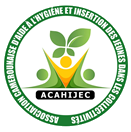Water, sanitation and hygiene for schools: A necessity
The need to sanitize toilets and the environment also concerns the development of practical skills, the mobilization and commitment of parents of students, communities and private partners to work together to improve hygiene, water and sanitation conditions in public kindergartens and primary schools. Although there are many possible approaches, depending on cultural differences and environmental and social realities, the "Water, Sanitation and Hygiene Education" initiative in schools must include the following elements :
Safe water supply points, hand washing points and sustainable sanitation facilities;
An integrated training in the practice of good hygiene rules in a school environment beneficial to students and teachers by professionals in this field while relying on participatory pedagogical modalities;
Raising awareness among families and communities in general about the importance of decent and well-stocked toilets.
Thanks to an adapted and effective implementation, the sanitation of toilets and the school environment must allow students to :
To be healthier thanks to the limitation of the proliferation of diseases related to the fecal hazard;
To have better academic results, the uncomfortable student does not follow the lessons, some have to return home to satisfy this physiological need with the corollary of absence from class;
To have a positive influence on hygiene practices in the family home, within their family and their community;
To learn to observe, communicate, cooperate, listen and apply decisions on hygiene conditions and practices for themselves, their friends and their younger siblings, if they are responsible for their hygiene (skills that can be transposed into other aspects of their lives);
To modify their current hygiene practices and to continue these good practices in the future;
To learn about menstrual hygiene physical and emotional changes related to puberty (learn to avoid menstrual odors, discomfort, vaginal and urinary infections. All this will encourage girls to come to school during their period);
In their respective families, regardless of gender, according to age, hygiene-related tasks: cleaning the toilet, fetching and boiling water and caring for sick people.



